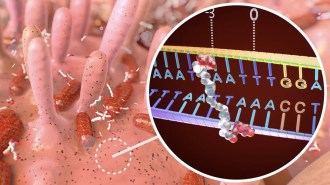Turmeric component kills cancer cells
The curry spice turmeric gets its yellow color from curcumin. This same compound kills cancer cells in laboratory tests, researchers report in the Sept. 20 International Journal of Cancer.
When mixed with cells from human head and neck cancers, curcumin stopped proliferation and induced cell suicide, or apoptosis, in the malignant cells, says study coauthor Yasunari Takada, a molecular biologist at M.D. Anderson Cancer Center in Houston. Curcumin had no effect on healthy cells.
Curcumin is an antioxidant that has anti-inflammatory effects. In this study, it suppressed the activity of NF-kappa-B, a protein that is overproduced in tumor cells. NF-kappa-B switches on genes for proteins involved in inflammation and cell replication.
Previous research suggested that curcumin stops proliferation of prostate cancer cells (SN: 5/18/02, p. 317: Available to subscribers at Spice component versus cancer cells). It also kills human breast and liver cancer cells in lab cultures, scientists from India report in the September Molecular Cancer Therapeutics. Tests on mice hint that curcumin might fend off Alzheimer’s disease, too (SN: 12/8/01, p. 362: Available to subscribers at A spice takes on Alzheimer’s disease).
Cancer researchers have taken an interest in curcumin because many countries with curry-rich cuisines, such as Sri Lanka, have lower cancer rates than Western countries have.
Takada and his coworkers are now screening curcumin’s effects on other types of cancer cells, including melanoma.







